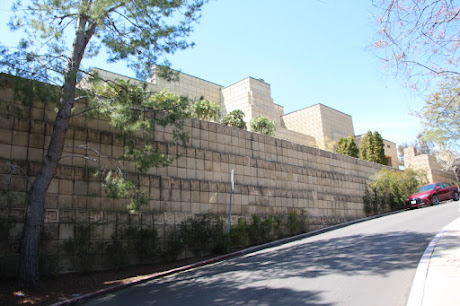Lisa Hirsch's Classical Music Blog.
The iron tongue of midnight hath told twelve. Lovers, to bed; 'tis almost fairy time.
Berce mollement sur ton sein sublime
Ô puissante mer, l’enfant de Dindyme!
Friday, June 30, 2023
Monday, June 26, 2023
Museum Mondays
Friday, June 23, 2023
Belated Museum Mondays
Thursday, June 22, 2023
More Saariaho
Amid all the sadness about Kaija Saariaho's death were many reports of her kindness and generosity to others, particularly other composers and performers. I want to also note that it's not everyone who has their adult children as artistic collaborators, but Saaiaho did. Her son Aleksi Barrière worked on translations for Innocence and her daughter Aliisa Neige Barrière is a conductor and violinist who was assistant conductor for the SFS bring-up of Adriana Mater.
Joshua Barone's review of Adriana mentions that there will be a recording based on the performances, which fills a gap in recordings of Saariaho's works.
- Statement from Saariaho's family at the composer's web site
- Announcement at Chester Music, Saariaho's publisher
- Announcement at Wise Music
- Joshua Barone, NY Times obit
- Joshua Kosman, SF Chronicle obit
- Tim Page, Washington Post obit
- Joe Cadigan, Opera News obit
- Alex Ross, blog post
- Alex Ross, The New Yorker
Wednesday, June 21, 2023
El último sueño de Frida y Diego
- Joshua Kosman, SF Chronicle
- Joshua Barone, NY Times
- Georgia Rowe, Opera News (link TBD)
- David John Chávez, KQEQ
- Lisa Hirsch, SFCV
- Alex Ross, The New Yorker
- David John Chavez, Preview, SF Chronicle
- Thomas May, Preview, NY Times
Sunday, June 18, 2023
Adriana Mater at San Francisco Symphony
San Francisco Symphony performed a semi-staged version of Kaija Saariaho's second opera, Adriana Mater, the other week. It was quite an emotional occasion: Esa-Pekka Salonen had known Saariaho since they were in school together. Peter Sellars, who directed, had known her since the 1990s.
My editor was sitting close enough that he could see that the cast and Salonen were in tears when Adriana was over. Nicholas Phan said on Twitter than the experience of learning and performing the opera had been life-changing.
- Joshua Kosman, SF Chronicle
- Joshua Barone, NY Times
- Lisa Hirsch, SFCV, 2023, San Francisco Symphony
- Patrick Vaz, The Reverberate Hills
- Charlise Tiee, Opera Tattler
- Michael Strickland, SF Civic Center
- Lisa Hirsch, SFCV, 2008 Santa Fe Opera
- Molly Colin, SFCV preview, 2023
JoAnn Falletta Profile
She's had a distinguished career with many highlights: music director of the Virginia Symphony, Ulster Philharmonic, Women's Philharmonic (which did so much important work), Long Beach Symphony, and of course the Buffalo Philharmonic. She's made a huge number of recordings, many of unusual repertory.
Falletta was recently awarded the 2023 Eroica Award for Outstanding Service in Music, by MOLA: An Association of Music Performance Librarians. You can read the full details here and also see Falletta's acceptance on YouTube.
AND, lastly, WBFO, an NPR affiliate, recently interviewed Falletta for their Mindful Music show. Give it a listen, and hear what this thoughtful and generous musician has to say.
Friday, June 16, 2023
Friday Photo
Monday, June 12, 2023
Sunday, June 11, 2023
Madama Butterfly, San Francisco Opera
- Joshua Kosman, SF Chron
- Michael Anthonio, Parterre Box ("Looking for Trouble", a most excellent headline)
- Jason Vincent Serinus, SFCV
- Charlise Tiee, Opera Tattler
Friday, June 09, 2023
Tuesday, June 06, 2023
Die Frau ohne Schatten at San Francisco Opera
- Joshua Kosman, SF Chronicle
- Lisa Hirsch, Opera News (paywalled)
- Steven Winn, SFCV
- Michael Anthonio, Parterre Box
- Charlise Tiee, Opera Tattler
- Michael Strickland, Civic Center
- Thomas May. Gramophone
- Alex Ross, The New Yorker
- Nina Stemme, Camilla Nylund, and Linda Watson on Frau
Monday, June 05, 2023
The Shining at Opera Parallèle
- Joshua Kosman, SF Chronicle
- Lisa Hirsch, SFCV
- Charlise Tiee, Opera Tattler
- Georgia Rowe, Mercury-News preview
Mueum Monday
Friday, June 02, 2023
Kaija Saariaho
We are crushed to announce that Kaija Saariaho has passed this morning. She slept away peacefully in her own bed, at home in Paris. As her family, we are issuing this as our solestatement, and request the peace of our time of mourning be respected.
In February 2021, Kaija was diagnosed with a glioblastoma, an aggressive type of brain cancer, found from the onset to be uncurable and lethal. With characteristically strong determination, she fought daily to both slow its growth and live fully. The multiplying tumors did not affect her cognitive faculties until the terminal phase of her illness; they were located in the area controlling her motor skills on the right side of her body, which led to growing difficulties in walking and talking, in turn exacerbated by ensuing falls and broken bones. Kaija's appearances in a wheelchair or walking with a cane have prompted many questions, to which she answered elusively: following her physician's advice, she kept her illness a private matter, in order to maintain a positive mindset and keep the focus on her work. Her case should however help raise awareness concerning the nature and detection of brain tumors. It should also highlight the plight of immunocompromised individuals: twice Kaija has contracted Covid in public events where insufficient measures were taken, if at all, to protect the most fragile among us. Her experience as a wheelchair user also made her more aware of the inadequacy of many locations she visited, including cultural venues. All of this she would now want publicized. She also hoped that, through the experimental treatment protocols she underwent at the Pitié-Salpêtrière hospital in Paris, she could, on a small scale, help advance research on conditions such as hers.
Kaija, who was born in 1952 in Helsinki, Finland, died prematurely at the age of 70, but lived a full life. Her early trajectory brought her from the avant-garde music circles of Finland to the European stage between Freiburg, Darmstadt and Paris, giving her the opportunity to contribute to the golden age of computer music, and later integrate a new understanding of harmony and psychoacoustics into the tradition of modern orchestra and opera writing. She achieved universal recognition among her peers and both public and critical success, all while never ceasing to challenge herself to explore new directions.
During the time of her illness, Kaija had the joy of being surrounded by a close circle of faithful friends and collaborators, and even of expanding it. She was involved in many new productions of her music, and in the premiere performances of her latest works: the Saarikoski Songs, the chamber music piece Semafor, the orchestra work Vista, the madrigal Reconnaissance, the re-creation of her first music theatre piece Study for Life, and her acclaimed last opera Innocence. She also did not relent in her commitment to teaching and passing the torch. One of her last endeavors was to lead the jury of an organ composition contest she initiated for the inauguration of the Helsinki Music Centre's new organ, an instrument she helped fund.
The final months of Kaija's life were devoted to the completion of her trumpet concerto. HUSH, which will be premiered in Helsinki on August 24* by Verneri Pohjola, with Susanna Mälkki conducting the Finnish Radio Symphony Orchestra. Kaija is survived by all of us who loved her and were blessed with her relentless generosity and insightful artistic support. But more importantly, we will all be survived by the bold, sensitive, exploratory music she has created, termed a classic of this century already in her lifetime.
Jean-Baptiste Barrière, composer and multimedia artist, her husband; Aleksi Barrière, writer and director, her son; Alisa Neige Barrière, conductor and violinist, her daughter



















